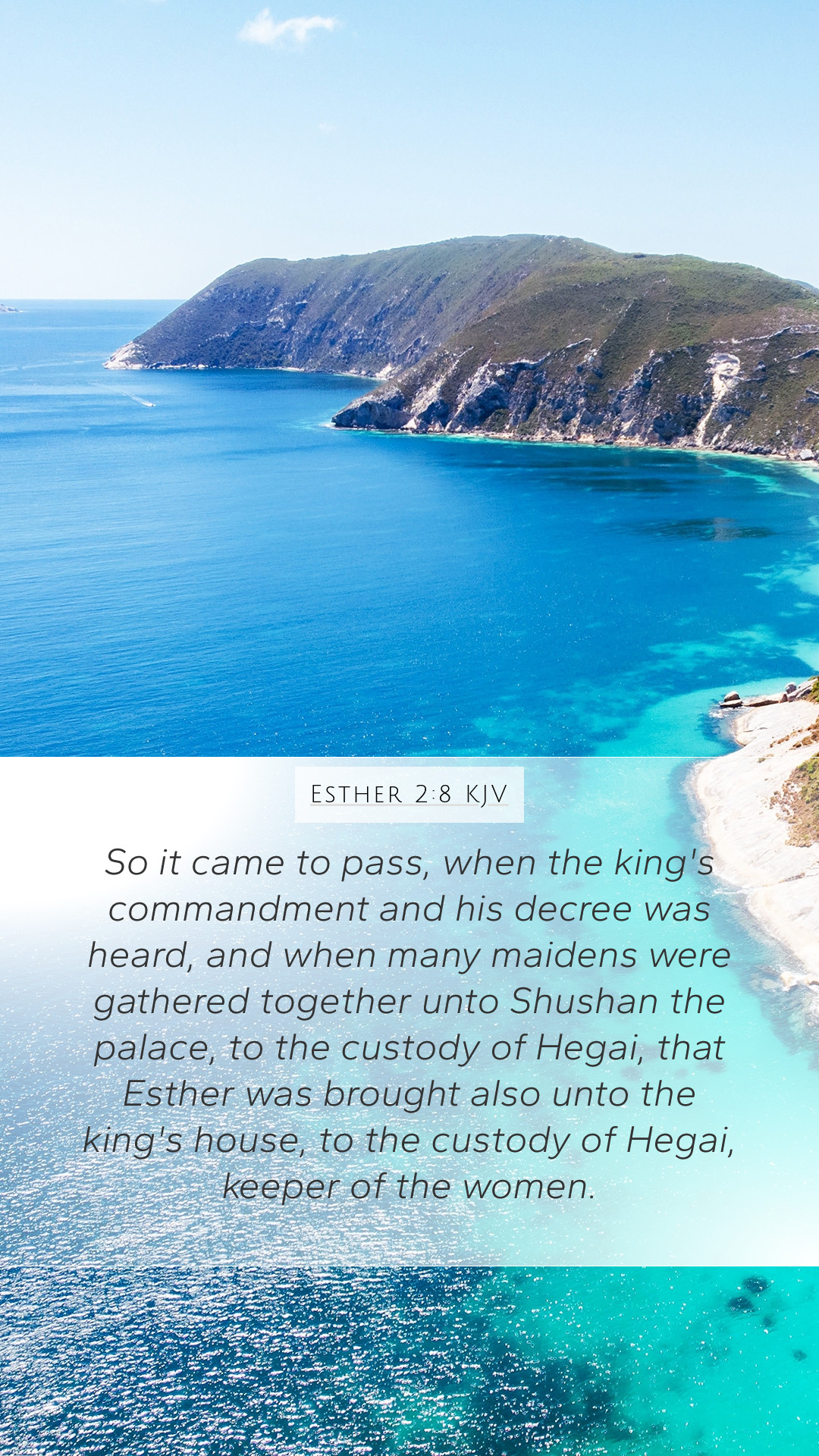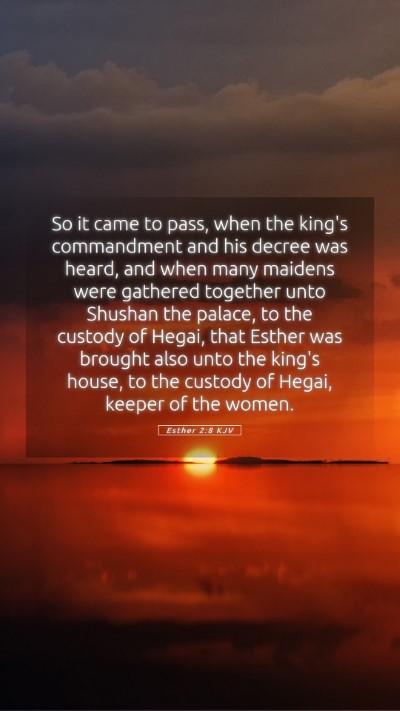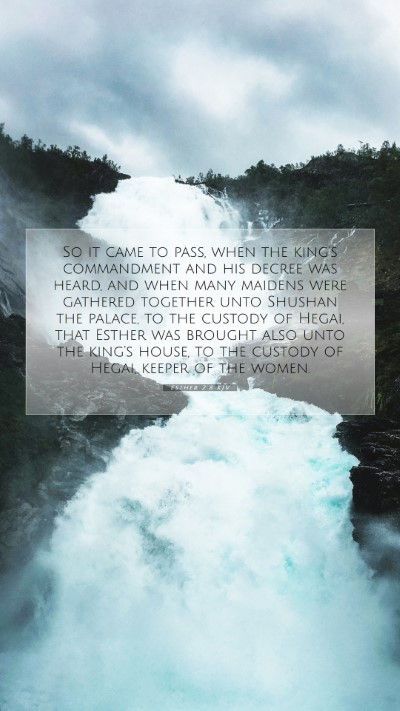Old Testament
Genesis Exodus Leviticus Numbers Deuteronomy Joshua Judges Ruth 1 Samuel 2 Samuel 1 Kings 2 Kings 1 Chronicles 2 Chronicles Ezra Nehemiah Esther Job Psalms Proverbs Ecclesiastes Song of Solomon Isaiah Jeremiah Lamentations Ezekiel Daniel Hosea Joel Amos Obadiah Jonah Micah Nahum Habakkuk Zephaniah Haggai Zechariah MalachiEsther 2:8 Meaning
What is the meaning of Esther 2:8?
So it came to pass, when the king's commandment and his decree was heard, and when many maidens were gathered together unto Shushan the palace, to the custody of Hegai, that Esther was brought also unto the king's house, to the custody of Hegai, keeper of the women.
Esther 2:8 Bible Verse Meaning
Understanding Esther 2:8 - Bible Verse Meaning and Commentary
Esther 2:8 reads: "So it came to pass, when the king's commandment and his decree was heard, and when many maidens were gathered together unto Shushan the palace, to the custody of Hegai, that Esther was brought also unto the king's house, to the custody of Hegai, keeper of the women." This verse marks an important transition in the narrative of Esther, setting the stage for her rise to prominence. Here, we explore the detailed meanings and insights drawn from several public domain commentaries, including those by Matthew Henry, Albert Barnes, and Adam Clarke.
Verse Context and Summary
The backdrop of Esther 2:8 is critical for understanding its significance. Following the deposing of Queen Vashti, King Ahasuerus seeks a new queen. This results in a gathering of young women, among whom Esther, a Jewish orphan raised by her cousin Mordecai, is included. The verse emphasizes Esther's introduction into a setting fraught with both opportunity and peril.
Commentary Insights
- Matthew Henry's Commentary:
Henry reflects on Esther's unexpected rise from obscurity to a position of high influence. He notes that her selection was both God's providence and a turning point for the Jewish people. The term "custody of Hegai" indicates that Esther was being prepared for great things, highlighting the divine orchestration behind circumstances.
- Albert Barnes' Commentary:
Barnes emphasizes the importance of the event, illustrating it as part of divine providence. He points out that the king’s decree and the gathering of young women signal a pivotal moment in the history of Israel, as Esther's lineage was significant for future generations. He suggests that this event should be viewed in a broader theological context, where God’s hand is visible throughout history.
- Adam Clarke's Commentary:
Clarke elaborates on the societal implications of Esther's inclusion among the maidens. He provides background on the customs of the Persian court and the importance of beauty and favor in royal selection. He reflects on the moral courage of Esther in such a precarious situation and how it leads to God’s deliverance of His people.
Thematic Elements
This verse introduces several key themes that resonate throughout the Book of Esther:
- Divine Providence: The circumstances leading to Esther's selection showcase God’s overarching narrative in the lives of His people, a common thread in biblical stories.
- Identity and Destiny: Esther's Jewish heritage will be crucial later in the story, reinforcing the theme of identity and God’s plan for His chosen people.
- Preparation and Purpose: Esther's time in Hegai's custody serves as preparation for her future role, reminding readers that God often prepares His servants for His purposes, even in seemingly ordinary situations.
Application to Daily Life
For modern believers, Esther 2:8 invites several reflections:
- Understanding that God orchestrates events in our lives for a greater purpose.
- Recognizing the importance of our identity and how it shapes our paths.
- Encouragement to prepare ourselves for opportunities, trusting that God may have a future role or responsibility for us.
Additional Bible Cross References
- Ruth 2:2 - The significance of gathering and choosing the right path.
- Esther 4:14 - Esther’s potential role in delivering her people.
- Proverbs 16:9 - The Lord directs the steps of a man, underscoring the principle of divine guidance.
Conclusion
Esther 2:8 sets in motion a series of events that demonstrate the interplay of divine providence and human action. Through deep analysis and commentary from esteemed biblical scholars, we see not just the historical context but also the ongoing relevance of this scripture. As readers and believers, engaging with such verses offers rich insights for both personal reflection and communal study within Bible study groups.
Explore these themes further as part of your Bible study insights and embrace the journey of understanding Scripture through not just Esther's story, but the lessons it imparts to our daily lives and spiritual growth.


